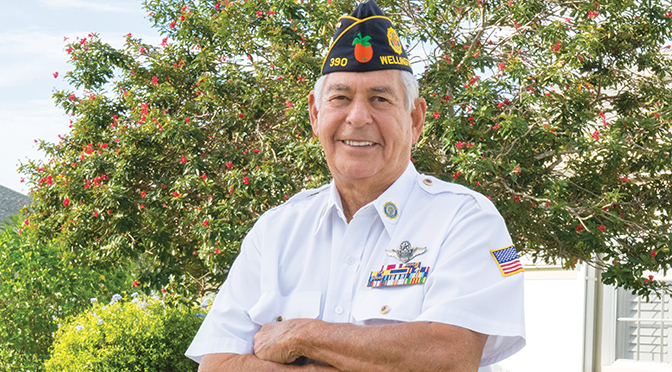Air Force Veteran Al Ziker Loves His Retirement In Wellington
In 1992, the 1,100-mile trip from veteran Al Ziker’s former home in Pittsburgh, Pa., to a spot west of I-95 in South Florida called Wellington was easy, especially for a man who had served his country as an Air Force navigator and made hundreds of flights from his base to a specific, ever-changing dot somewhere high above the Atlantic or Pacific oceans.
“My wife and I wanted to move to Florida, and we had friends in Wellington, so we looked here and chose a house we liked,” Ziker recalled.
In Wellington, the couple found a hometown they loved, and a great place for their son and daughter and their families to visit. Today, they have four grandchildren, the youngest of whom is 20.
A 1956 graduate of the University of Pittsburgh, Ziker joined the military shortly after he earned his degree and served 20 years in the U.S. Air Force, in postings around the United States, Europe and the Pacific.
After leaving the Air Force in 1976, Ziker lived in Philadelphia for 15 years, before making the move to Wellington.
“I worked in a home center [in Pennsylvania] and worked for Home Depot when I moved down here,” Ziker said.
In retirement, he is the president of his homeowners’ association and a property manager. “In my spare time, I still do a bit of woodworking,” Ziker added.
He is also very active in the local American Legion post, Wellington’s Chris Reyka Memorial Post 390, where he has served as post commander.
During the two decades Ziker served in the Air Force, he began his training at Lackland Air Force Base near Houston. His postings were in Massachusetts for seven years, then Mississippi for three years, Ohio and Germany for a few years each, and California for 18 months, with two tours in Okinawa, a year in Thailand and a shorter time in Goose Bay, Labrador.
That speck over the ocean mentioned earlier refers to Ziker’s job navigating his refueling plane to the rendezvous point so another military plane running on empty could be assured of finding a filling station with a full-service fill-up.
His crew serviced fighters, bombers and even the famous SR-71 Blackbirds, a mach-3-capable aircraft in operation for 32 years beginning in 1966 — the most sophisticated plane in America’s arsenal in its time.
“We had a four-man crew: a pilot, co-pilot, navigator and a boom operator who controlled the boom to put it into the fighter or the bomber, whoever we were refueling,” Ziker explained. “The pilot and co-pilot kept the plane moving smoothly in a straight line. I got us to the right spot.”
Ziker explained that it could be exciting with no computer-assisted equipment. “It was all manual controls. Just like refueling your car, you put the boom in the receptacle on the fighter or bomber,” he said. “It has something like a pop-up valve, it pushes it open and the fuel starts going in.”
Ziker said that the navigator makes sure a refueling plane is at the exact right place at the time a fighter or bomber, with only minutes of fuel left, arrives there needing to be resupplied, high above the open ocean.
“We had some emergencies, but nothing life-threatening,” Ziker said. “We had a boom that got jammed. It was extended the full length and didn’t want to retract.”
It was an experience that took some worrying minutes to resolve and get the boom stowed properly.
Now, in more relaxed times, Ziker reflected on what he likes most about his adopted hometown.
“What I like best about Wellington per se: the beauty, they try to really keep it up here really nice and they are pretty strict about keeping the beauty of the neighborhoods,” he said.
Ziker continued that the neighborhoods look good because the homeowners’ associations have a lot of documents to follow to keep them looking nice. “You can’t paint your house purple, you can’t raise dogs or cats or cows or goats in the front yard,” he said. “The village does a good job of trying to keep the village neat.
Ziker feels the equestrian community also contributes to the overall beauty of the community. He considers them a very important part of the Wellington lifestyle.
“Plus, the equestrians are nice,” he said. “They come in here, they bring a lot of money with them. If it wasn’t for them, Wellington wouldn’t be where it is today.”
